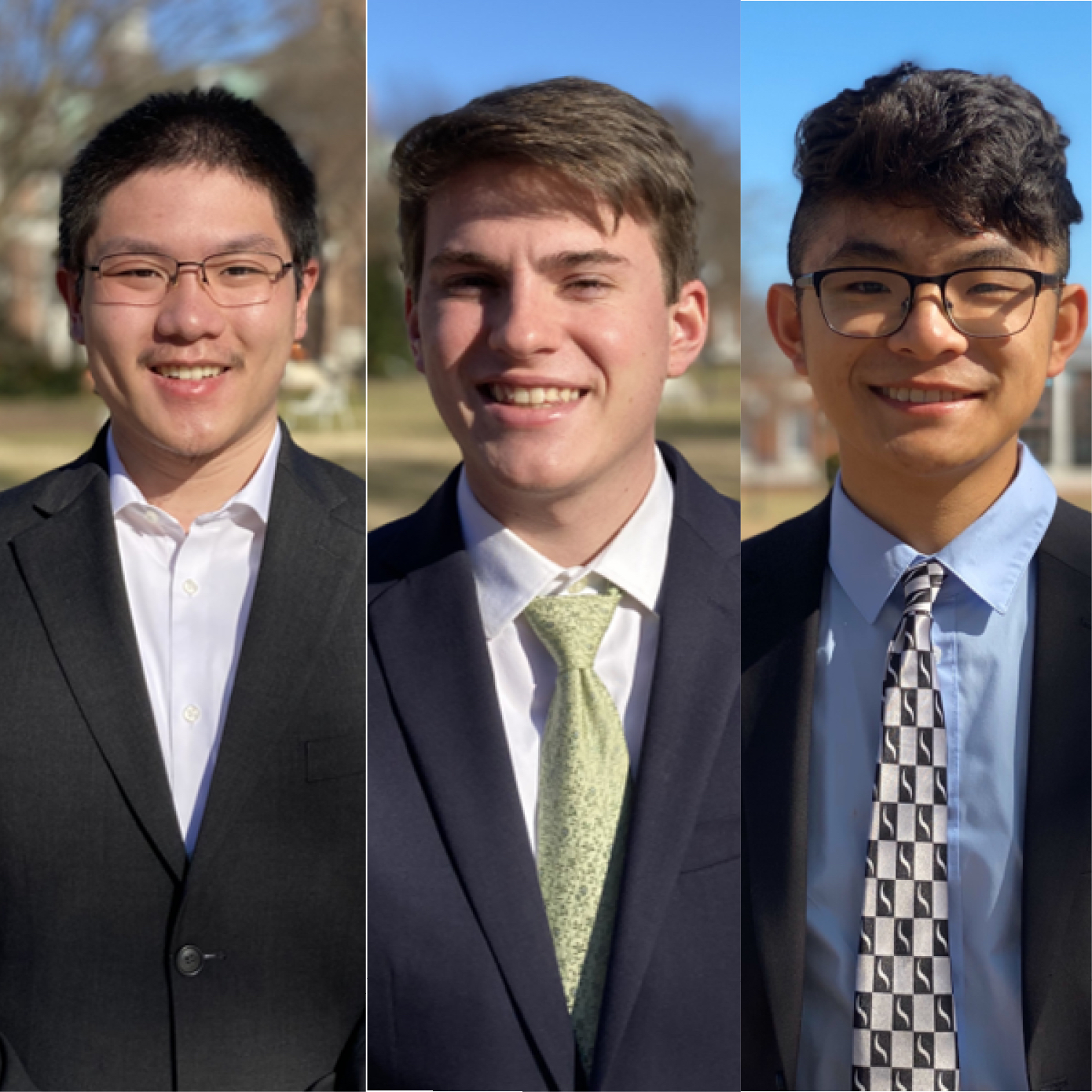Bruce Enzmann, Michael Lan, and Anson Zhou
The Innerva team, made up of students representing the Johns Hopkins University Whiting School of Engineering, Bruce Enzmann, Michael Lan, and Anson Zhou, invented a way for those with peripheral nerve injuries to have functional nerve recovery while preventing the formation of painful nerve tumors, or neuromas. Working in tandem with the gold standard targeted muscle reinnervation (TMR) nerve repair procedure, Innerva’s device solves post-TMR neuroma pain that results from an inherent nerve “size-mismatch” and afflicts 30% of patients. Innerva addresses this issue by creatively modulating nerve regeneration through a conical nerve conduit with a gel filling. The multidisciplinary team of students have a passion for developing medical technologies that enhance the quality of life for patients. They were awarded the 2021 $10,000 “Cure it!” Lemelson-MIT Student Prize for their work.
Bruce Enzmann is a junior from Virginia Beach, Virginia studying materials science and engineering with a concentration in biomaterials engineering. Bruce has experience working on a range of projects with doctors and laboratories at Virginia Wesleyan University, the University of Pennsylvania, and Johns Hopkins University. Bruce’s work in influential laboratories surrounded by impactful projects, captivating procedures, and brilliant peers and mentors, has stimulated his lifelong goal of studying polymeric biomaterials with translational applications. He is committed to researching and developing bioengineered technologies to optimize antioncogenic drug delivery, promote tissue repair, provide tissue modeling platforms, and enhance neuroregeneration. Bruce also works as a teaching assistant and is co-president of the Johns Hopkins Society for Biomaterials chapter — an organization which enables research, outreach, and education of biomaterials in the broader scientific community.
Michael Lan is a senior from Hockessin, Delaware studying biomedical engineering with a focus on translational cell and tissue engineering. Michael first worked in biomedical engineering research at the University of Delaware under Chris Price, PhD. Throughout his undergraduate career, Michael has been part of the Mao Lab at the Institute of NanoBioTechnology and the Translational Tissue Engineering Center at Johns Hopkins University. Here he has worked on developing several new technologies and devices for biomedical applications to improve patient outcomes, with a specific interest in neuroregenerative and neuroprotective applications. Michael is a teaching assistant for several engineering courses, and he is also the president of The Inter-Asian Council at Johns Hopkins University, a group focused on addressing Asian American sociopolitical issues. Through all his mentoring and professional experiences, Michael is passionate about helping and supporting others, professionally and personally, with a focus on efforts that contribute to a better community.
Anson Zhou is a sophomore studying biomedical engineering with interests in medical device translation and commercialization, biomaterials, education outreach, and cooking. He was raised in Brookhaven, New York, where he first discovered his interests in interdisciplinary research as a high school research fellow at the Stony Brook University Garcia Center for Polymers at Engineered Interfaces. Upon arriving at Johns Hopkins University Anson began as an undergraduate researcher at the Institute for NanoBioTechnology. Since then, he has worked on several biomaterials-based devices including the conical nerve conduit, and more recently collaborating with overseas textile manufacturers to develop highly breathable and accessible face mask filters. Anson is the co-founder of a medical device startup called “Pediafeed,” which has developed a gastrostomy tube for neonates and infants that is resistant to displacement and can be easily replaced at home by caretakers. Anson’s work has inspired him to be deeply invested in the translational process and rely on the support of diverse mentors to address the multi-dimensional considerations that are required to effectively bring an invention to reality. Anson also works on the Access and Diversity Committee at the JHU Admissions Office and organizes mentoring initiatives for incoming biomedical engineering students.
Media Coverage
Baltimore Business Journal


